MICHAEL ROSE / “No Burial”
What is Roots reggae? What’s the difference between a ‘real’ Roots tune and any other reggae song? Is it conscious lyrics? Is it pulse-pounding bass? The heavy, slowed-down skank? The piercing wail of the lead singer? The anthemic, sing-along quality of the choruses? Or is it the time period? Is there any such thing as a ‘real’ Roots record that wasn’t recording during the Seventies? What about one that was neither recorded in Jamaica nor performed by a Jamaican musican? Sure there is. Follow me now.
Ini Kamoze – “World-A-Music” – Available on 16 Vibes Of Ini Kamoze (Sonic Sounds, 1992)
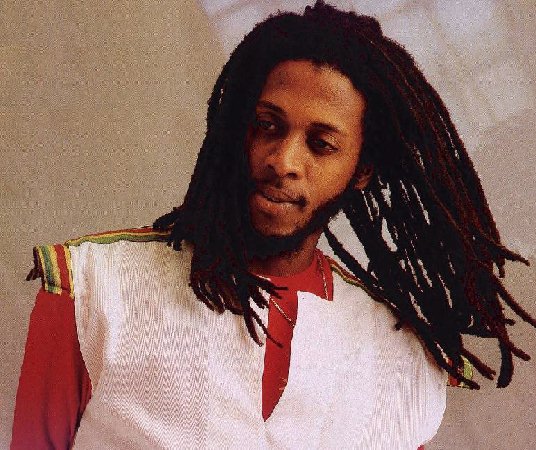
It took me a while to track down this first one. It’s the original source of the riddim made famous by Damian Marley’s 2005 scorcher “Jamrock.” Damian’s track wasn’t the first time someone had major success with the ‘World-A-Music’ riddim—Dennis Brown hit big with 1985’s “Joy In The Morning,” to name just one example—but Damian brought it to that whole next level. On the original, which was first released on the out-of-print 1984 Ini Kamoze LP, the subsonic throb of Robbie Shakespeare’s electric bass merges perfectly with Willie Lindo’s echoing guitar work, the combination providing a nice backdrop for Kamoze’s spaced-out warbling. Trivia note for Damian Marley fans. When Kamoze sang that famous line (“Out in the streets, they call it murder…!”), he was talking about killing the rhythm, not his brethren. The rest of the line is, “…when riddim’s spacing out your head.”
Michael Rose – “No Burial” – From African Roots (M Records, 2005)
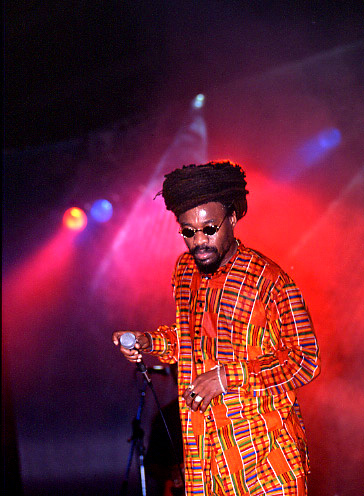
Michael Rose’s career started way back in the early Seventies, but he’s best known as the lead vocalist for the second (and most famous) incarnation of the reggae super-group Black Uhuru. Today, Rose has been performing without Black Uhuru longer than he performed with them (he left around 1986), but his solo career—if you want to call it a career—has been beset by sporadic recording, cheesy instrumentation and indiscriminate songwriting. In fact, I’d argue that Rose never released a good album until last year’s African Roots…and with a title like that, it better have been good. The new album finds Rose leaving behind the feather-weight rhythms and corny lyrics, hopefully for good. Musically, “No Burial” is deep, deep in the pocket—it stands up to anything Rose ever did with Uhuru (and that includes some bona fide classics). Lyrically too, Rose comes with it, dropping that peculiarly Rastafarian blend of wit, wisdom and paranoia.
Alpha Blondy – “Jerusalem” – From Jerusalem (EMI, 1986)
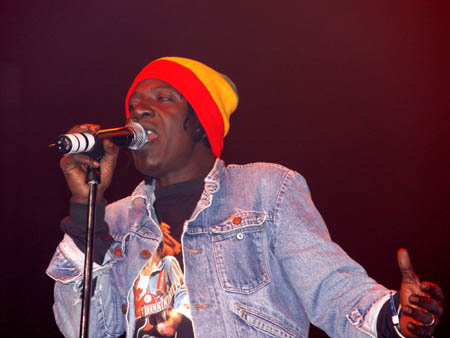
These days, Alpha Blondy’s “Jerusalem” sounds like a fantasy. Blondy sings, “You can see Christians, Jews and Muslims living together and praying, Amen.” But between the ongoing war in Iraq, the continued occupation of Palestine and the religion-fueled madness in full swing in several parts of Africa, it’s hard to see how that statement makes any sense today, if it ever did. The message might be a bit fantastical, but the music—courtesy of The Wailers Band—is as real as it gets. The Wailers Band locks into one of those hypnotic grooves they perfected back in their Marley days; and once they get it right, you know they’re not going to let it go. If Blondy’s message fails to persuade, it isn’t for lack of effort. Whether in English, Hebrew or Arabic, Blondy’s call for religious peace is impassioned and heartfelt. Jerusalem was the Ivory Coast reggae star’s fourth international release, and if there was any doubt about his status as a ‘real’ reggae artist, the Jerusalem album settled it.
Nengo Vieira e Tribo D'Abraão – “A Vida” - Mata Atlântica (2002)
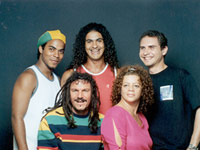
Now that we’ve established that Roots doesn’t necessarily have to come from Jamaica, here’s another question. Does it have to be in English? If asked, I’m sure that Bahian reggae specialist Nengo Vieira would answer with an emphatic não. The truth is, there’s a large audience for Roots reggae in Brazil. Frequently, when I’m surfing Brazilian sites looking for new music to check out, I come across whole pages of listings dedicated to not only well-known Jamaican reggae artists, but homegrown reggae musicians as well. I haven’t heard Nengo’s entire album, but with this track, “A Vida,” he acquits himself well. Nengo and the band work up a nice, mellow skank and have the good sense to simply let it ride, Roots style.
Well, I was writing this, my sister walked in and asked me what was I working on. I said, “A post about Roots reggae.” Ini Kamoze’s “World-A-Music” was playing. She listened for a minute. Then, right on topic she said, “What is Roots anyway? I know it’s supposed to be different from regular reggae, but what’s the difference? Is it just slower or what?” I had to start laughing, because honestly, I don’t know the answers to her questions.
The usually reliable Wikipedia defines Roots reggae as:
The name given to Rastafari-movement reggae music from Jamaica which evolved from Ska and Rocksteady and was made famous outside the Caribbean by the legendary singer/songwriter Bob Marley. Roots reggae is an inherently 'spiritual' type of reggae music, the lyrics of which are predominantly in praise of Jah Ras Tafari Makonnen — Haile Selassie (1892–1975) the Emperor of Ethiopia (1930–1974).But that’s as much a definition of reggae as a whole as it is a definition of any particular type. Excluding dancehall and lovers rock, just about all reggae would fall under their definition, right?
Encyclopedian.com says Roots reggae is:
A type of pure reggae which combines the traditional ska sound with American rock and roll, R&B and pop music. It is the most accessible form of reggae, and the most popular globally, primarily due to the success of superstar singer Bob Marley.Which made me curious. If that was their definition of Roots, how would they define reggae itself? ‘Reggae,’ they say, is:
An African-Caribbean style of music which developed on the island of Jamaica and is closely linked to the religion Rastafarianism, though not universally popular among its members. The origins of Reggae can be found in traditional African-Caribbean music as well as US Rhythm & Blues.Is there a substantive difference in those two definitions? I don’t think so. So what’s the problem? Why is it so hard to say what exactly ‘Roots reggae’ is? Part of the problem is words are words and music is music. It’s often difficult to even describe music well, let alone define it. I do know this: I own hundreds of reggae albums; some of them have that authentic Roots vibe and some don’t. I may not be able to define Roots, but when a song with a real Roots feel comes on, I know it right away. I know it because I feel it. So, whether the source is Bahia, Brazil; Dimbokoro, Ivory Coast; or 21st century Jamaica, I’ll just say Roots is Roots. I know it when I hear it.
—Mtume ya Salaam
Another Island's Roots
OK, Mtume, you made me do it. I was saving this for a little further down the line, but here you come with your Brazilian and Ivory Coast roots reggae, so I’ve got to lay a lid of some Fat Freddy’s Drop on you. (And if you want a fuller appreciation of the hidden meaning in that sentence you can go to this online interview and it will explain some of the meanings behind the choice of words).
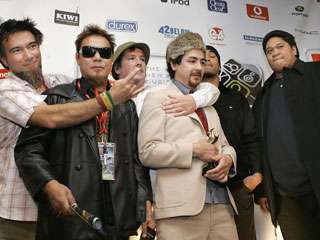
Fat Freddy’s Drop is a reggae/kiwi band out of New Zealand, and I will feature them soon, but for now give a listen to their single “Hope,” which, by the way, is way different from the track “Hope” that is on their debut full length album, Based On A True Story. The album version is gospel-influenced, but this single is straight-up skanking reggae (with some other elements thrown atop) in typical Fat Freddy fashion.
Bob Marley blew through New Zealand and the is/land next to “down under” has been in love with reggae ever since. But bully for them, they are not simple imitators. They have their own Maori-roots culture which undergirds their music. Plus they really are a “they”—a seven-member band that makes its best music live rather than in a studio, thus they maintain a contact high with their audience that you don’t get when the majority of your music is studio created.
Y'all just wait til y'all hear more of this stuff, you won’t believe it. Right long thru here, Fat Freddy’s Drop is my favorite reggae band. To be continued….
—Kalamu ya Salaam
This entry was posted on Saturday, May 20th, 2006 at 11:50 pm and is filed under Contemporary. You can follow any responses to this entry through the RSS 2.0 feed. You can leave a response, or trackback from your own site.
3 Responses to “MICHAEL ROSE / “No Burial””
May 22nd, 2006 at 8:30 am
Ya know how like when yo children grow up n they suppose tuh take it tuh anothuh level? Well, Fat Freddy’s Drop has done that with roots raggae, brought it into the 21st century, taking it to anothuh level.
May 23rd, 2006 at 9:43 pm
Wow! I haven’t heard Alpha Blondy in YEARS…reminds me of my rebellious College days.
July 25th, 2006 at 12:39 pm
i love the reggae, its all about roots.
roots takes reggae to the next level
Leave a Reply
| top |